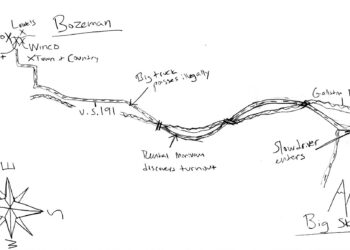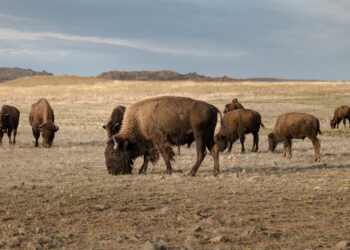A look at Rep. Zinke and his Public Lands in Public Hands Act
By Benjamin Alva Polley EBS COLUMNIST
It’s primary season in Montana, the time of the year when many politicians try to convince voters they are reliable conservationists, promoting certain issues months ahead of the election. Few, if any, single issues unite voters more in Montana than public land protections. A 2020 poll by Colorado College found that 84% of Montana voters say that issues involving clean air, clean water, public lands and wildlife are deciding factors in who gets their votes.
Montana Congressional Representative Ryan Zinke, a Republican up for reelection, recently announced he’s sponsoring bipartisan legislation with Representative Gabe Vasquez (D-NM) to restrict the transfer of federal lands to private ownership.
According to Zinke’s recent Letter to the Editor on March 17 in Kalispell’s Daily Inter Lake, the Public Lands in Public Hands Act is “bipartisan legislation banning the sale or transfer of public lands managed by the Department of the Interior and U.S. Forest Service except under particular conditions and where required under previous laws.”
He writes, “If a tract of land is identified as exempt from the ban, the bill also requires the feds seek Congressional approval before they may sell or transfer tracts over 300 acres and for tracts over 5 acres if accessible via a public waterway, [public road, public trail, public easement, or public right-of-way]. This provision would protect public access to nearly 30 million acres.”
It sounds like a good idea. However, he writes, “Maintaining public ownership of the land is only one part of the equation. The feds must also properly manage the land and ensure public access.”
Zinke criticizes environmentalists and the Biden administration in his letter for reasons including poor forest management. “Driving through the Beaver-Deerlodge National Forest, Glacier National Park, and the Lolo, you’ll see stands of dead and dying timber and forest floors that are a literal tinderbox. In addition to being too densely covered to supply any quality habitat or hiking opportunities, they are also fuel loads waiting to go up in flames,” he writes.
Further down in his letter, Zinke hints that this bill is more of a call to open public lands for increased management and industry. “Every year we watch our forests burn to the ground when commonsense forest management techniques such as targeting thinning, prescribed burns, and sustainable yield logging is proven to increase fire resiliency.” Sure, some of our forests are overgrown, more so because of the suppression of wildfires over the last century and massive budget and personnel cuts in the Forest Service. Overgrown forests aren’t necessarily a trigger to open them to industry such as logging, but maybe more of an invitation that we may need more fires to prevent the mega-fires, as The Harvard Gazette reported on June 14, 2023.
This bill has garnered widespread support from the Theodore Roosevelt Conservation Partnership, Congressional Sportsmen’s Foundation, Backcountry Hunters and Anglers, Montana Outfitters and Guides Association, Boone and Crocket Club, Rocky Mountain Elk Foundation, Trout Unlimited, and Wild Sheep Foundation. In this highly divided country, we should applaud when Republicans and Democrats can unite, sit at the table, and sponsor a bill about public lands.
But while this bill doesn’t appear harmful, it doesn’t protect public lands or increase access to them. The bill states, “Nothing in this Act shall be used to influence or interpret the legality of stepping over a property corner from one parcel of public land to another”—meaning it doesn’t allow recreationists like hunters and anglers to corner-cross private property to access public lands encircled by private property, a trending topic.
On Feb. 20, Montana Free Press reported that Whitney Tawney, executive director of Montana Conservation Voters, is skeptical of this announcement and thinks Zinke’s bill’s timing “feels very political.”
“We need to hold our elected officials accountable for their records and their actions because, unfortunately, during political season, people run their mouths and say anything to get re-elected or elected,” Tawney told MTFP. “Under his leadership as Secretary of the Interior, we watched [Zinke] take away public land protections across the United States, and that’s quite concerning.”
Let’s examine Zinke’s environmental scorecard regarding conservation—clean air, clean water, public lands and wildlife—and whether or not his track record suggests this is a form of greenwashing and a publicity stunt to gain votes.
According to Montana Conservation Voters, since 2015, Zinke has voted six times against bills supporting public lands, 14 times against bills supporting wildlife, 17 times against clean water bills that would force stipulations limiting mining waste and pesticides, 10 times against clean air, 24 times against climate change, 12 times against lands and forests and three times against allowing the public the right to know when there are toxins in the environment. He has voted 23 times to not limit “dirty energy” by cleaning up waterways, the air, or land.
Let’s not forget that when he was the Secretary of the Department of the Interior, he recommended the single most significant rollback of public lands in American history: drastically cutting both Bear Ears National Monument and Grand Staircase-Escalante National Monument in Utah. Not long after this, he also recommended reducing protections for national monument lands in Oregon and Nevada, potentially damaging management plans in Maine, New Mexico, and the Atlantic and Pacific oceans, and opening them up to mining, logging and fishing. He voted to weaken protections for sage grouse, mule deer and pronghorn antelope by opening up America’s sage-brush sea to oil, gas and mining. He also wanted to gut a rule protecting communities from methane pollution from oil and gas drilling. He tried paving the way to open up drilling in the Arctic National Wildlife Refuge. He also encouraged mining next to America’s most visited Wilderness, Minnesota’s Boundary Waters Canoe Area Wilderness.
Montana Conservation Voters gave Zinke an environmental scorecard of 6% in 2023 and a lifetime record of 4%. Politicians know they can’t get elected in Montana without standing up for public lands, but as soon as people aren’t paying attention, politicians seem to cater to industry and big money.
This November, remember that actions speak louder than words.
Benjamin Alva Polley is a place-based storyteller with stories published in Outside, Adventure Journal, Popular Science, Field & Stream, Esquire, Sierra, Audubon, Earth Island Journal, Modern Huntsman, and other publications at his website www.benjaminpolley.com/stories. He holds a master’s in Environmental Science and Natural Resource Journalism from the University of Montana.













